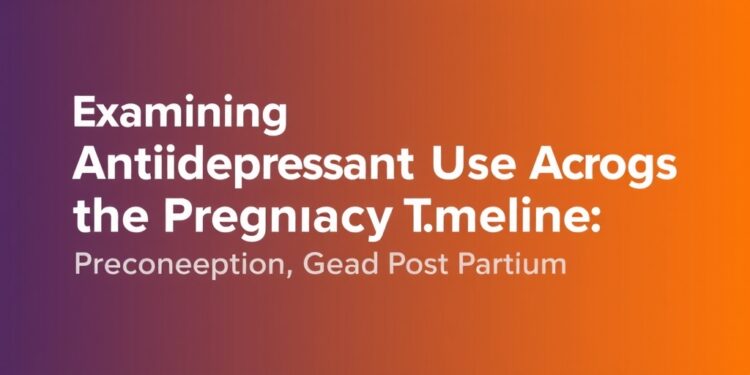
In a compelling exploration of the mental health landscape during pregnancy, a recent cohort study has unveiled significant findings that warrant attention from both clinicians and expectant mothers. This research reveals a substantial reduction in the use of antidepressants among pregnant women, contrasted by a lack of increased engagement in psychotherapy. This disconnect raises critical questions about the approaches to mental health care for women during such a transformative period in their lives.
Pregnancy is often characterized by a multitude of physical and emotional changes, which can have profound implications for a woman’s mental health. While the focus is understandably placed on the health of the developing fetus, the psychological well-being of the mother is equally paramount. This study underscores the pressing need for healthcare providers to prioritize discussions about mental health treatment options alongside traditional prenatal care.
The cohort study highlights a trend that appears concerning: the dramatic decrease in antidepressant prescriptions to pregnant women. Despite the well-documented prevalence of mental health challenges during pregnancy and the postpartum period, the data suggest that many women are either foregoing medication that could alleviate their symptoms or are being advised against it. This trend poses potential risks to both maternal and infant health and underscores the importance of informed clinical discussions.
Additionally, the study’s findings call attention to a critical gap in mental health support during pregnancy. While psychotherapy is recognized as a valuable intervention for various mental health issues, the lack of an uptick in its use during this time raises eyebrows. Many women may not be receiving the supportive therapeutic interventions they need to navigate the emotional complexities of pregnancy. The absence of such support could lead to a deterioration of mental health, affecting not only the mothers but also their ability to care for their children.
Mental health professionals and obstetricians must work collaboratively to create a comprehensive care model that includes mental health assessments as a routine part of prenatal visits. Just as physical health screenings are non-negotiable in prenatal care, mental health evaluations should also be an integral component. This approach would facilitate the identification and treatment of those facing mental health challenges, ensuring that women receive a holistic standard of care.
The role of education cannot be overstated in this context. Many expectant mothers may not be fully aware of their options regarding medication and therapy. Healthcare providers must be proactive in disseminating information about the potential benefits of mental health treatments during pregnancy. Enhanced education will empower women to make informed choices about their care and engage in conversations with their clinicians about their mental health needs.
Furthermore, social stigma surrounding mental health issues during pregnancy can lead to feelings of shame or inadequacy in mothers-to-be. Addressing these societal perceptions and fostering an environment where mental health is openly discussed can significantly improve outcomes. The normalization of mental health issues in pregnancy is crucial in encouraging women to seek the help they may desperately need.
Clinical guidelines have traditionally emphasized the safety of certain antidepressants during pregnancy. However, the hesitancy to prescribe these medications reflects a broader concern about the potential risks to the developing fetus. The complexity of balancing maternal mental health needs and fetal safety is indeed challenging, and the nuances of individual cases necessitate personalized treatment approaches.
The investigation into the impact of prenatal mental health on long-term child outcomes also warrants further scrutiny. Research suggests that untreated maternal depression can adversely affect infant development, leading to cognitive and emotional difficulties later in life. As such, ensuring that mothers receive adequate mental health support not only improves their immediate well-being but also has profound implications for the next generation.
In conclusion, this cohort study serves as a clarion call for the healthcare community to reevaluate how mental health care is incorporated into pregnancy protocols. The findings illustrate the urgent need for dialogue and education about mental health treatments, particularly in light of the observed declines in antidepressant use without an increase in psychotherapy. As society continues to prioritize maternal health, ensuring that mental health is part of the conversation is an essential step toward comprehensive care.
Expecting mothers deserve a supportive framework that acknowledges and addresses their mental health needs. Breaking down the barriers to accessing effective care and fostering an open dialogue will ultimately create a healthier environment for both mothers and their babies. The findings from this study not only contribute to the body of research in the field but also inspire a necessary shift in how we approach mental health during pregnancy.
As we continue to advance our understanding of maternal mental health, the implications of this research are clear: a well-rounded approach that integrates both physical and mental health care is essential for the well-being of mothers and future generations.
Subject of Research: The decrease in antidepressant use among pregnant women without a corresponding increase in psychotherapy utilization.
Article Title: A Significant Decrease in Antidepressant Use During Pregnancy: A Call for Improved Mental Health Support
News Publication Date: October 2024
Web References: [Link to the study to be added post-embargo]
References: [Scientific literature references to be added post-publication]
Image Credits: [Credit information to be added post-publication]
Keywords: Pregnancy, mental health, antidepressants, psychotherapy, maternal health, cohort studies.
Tags: antidepressant use during pregnancycohort study on pregnancy and antidepressantshealthcare provider discussions on mental healthimplications of antidepressant reductionmaternal mental health challengesmental health care for pregnant womenpostpartum mental health treatmentprenatal care and mental healthpsychological well-being during gestationpsychotherapy engagement in pregnancyrisks of untreated maternal mental healthwomen’s health during pregnancy and postpartum





